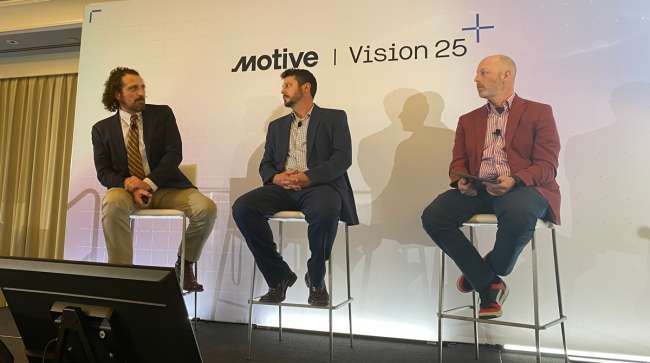From left to right: Baskin, Camden and Garney. (Connor D. Wolf/Transport Topics)
AUSTIN, Texas — President Donald Trump’s commitment to reduced federal regulations is expected to lead to a shift in how transportation policy is handled, experts detailed during a discussion April 21.
The discussion was hosted as part of Vision 25 — The Motive Innovation Summit. The three-day conference brought together leaders from across the transportation space. This year it was hosted just months into a new administration determined to reduce federal jobs and regulations.
“Obviously our focus is going to be deregulatory,” said P. Sean Garney, co-director of Scopelitis Transportation Consulting. “The government’s always been really good at building and improving, but not so good at evolving, right, at becoming, not just more efficient, but different to serve the people in a different way. And so, I’m hoping that there’ll be some really creative folks at the agency, those that are left, to make true innovation.”
The Department of Transportation issued a notice April 3 requesting public comments on how to deregulate the transportation space. This came in response to an executive order aimed at promoting economic growth through deregulatory efforts. Garney noted a lot of people have already submitted comments.
“We’re definitely going to focus on ways to make the industry more efficient,” Garney said. “You’ll recall the last Trump administration gave us quite a bit more flexibility on hours of service, and they went pretty far down the road. But they stopped right before giving us that extra added flexibility to our sleep rules.”
RELATED: Trump DOT Repeals ‘Woke’ Emissions Performance Metrics
The Federal Motor Carrier Safety Administration dictates how long truck drivers can operate and when they must take breaks. Garney believes these rules should be more flexible so drivers have the ability to drive when they are awake and stop when they are tired.
“One thing that I don’t think has changed, and I don’t think it’s going to change, is the focus on safety,” said Matthew Camden, division director for freight, transit and heavy vehicle safety at the Virginia Tech Transportation Institute. “I think FMCSA, and the USDOT, is going to remain focused on safety. Whether that’s the different regulations or the policies, or doing the research to help the industry identify ways to be safer, I think that is going to stay the same.”
Derek Barrs was recently nominated as administrator of FMCSA. He comes with a decades-long background in transportation safety between his tenure with the Florida Highway Patrol and Florida Department of Transportation. He has also worked as a consultant on traffic and commercial vehicle safety projects in multiple states.
“He’s been a partner in a lot of different associations over the years and he’s demonstrated his commitment to safety for a long time,” Garney said. “When they finally approve Derek to become the administrator, I think FMCSA will be poised to act a little bit more quickly than they were under the merry-go-round during the Biden administration.”
Garney noted that previously it was difficult because a lot of people came in without much experience in transportation. He recalled how that caused a slowdown in ongoing projects because the new teams and leadership who could execute on these plans needed to be caught up on the nuances of transportation.
“So now you’ve got to educate them so that they’re comfortable making the decision,” Garney said. “That’s not going to be the same with Derek. He’s already well entrenched in the industry and he’ll be poised to hopefully move fairly swiftly to the extent that he can.”
Garney also suspects that whatever transportation jobs get cut won’t be as focused on FMCSA. But he suspects hiring is going to be difficult and the agency has lost talent to early retirements already. He is expecting some talent at the top of the agency to leave as well.
“That could slow things down because there’s a bunch of learning that has to happen and there’s a whole bunch of institutional knowledge that sort of fell off,” Garney said. “From a practical standpoint, for like motor carriers in the room, how is this going to impact what I do on a daily basis, I think that you’ll see the impact just on the margins, really.”
Garney noted that states are performing most on-the-ground enforcement instead of the federal government so that shouldn’t be too impacted. He also doesn’t expect much of a reduction in grants. But that isn’t the case when it comes to compliance reviews.
“They do about twice as many compliance reviews as the states do, and certainly there could be a slowdown in that,” Garney said. “I think the biggest impact for carriers is the same impact that every business is dealing with, which is a certain level of uncertainty. It’s difficult to plan if you can’t predict what’s going to happen in the future.”






